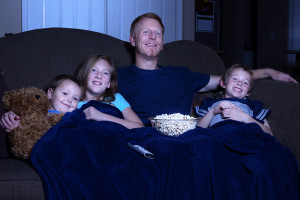 Through the decades, the manner in which fathers are portrayed on television has evolved dramatically.
Through the decades, the manner in which fathers are portrayed on television has evolved dramatically.
Some of our earliest TV dads depict an idealized image of fatherhood. Dads like Ward Cleaver in Leave It To Beaver and Father Knows Best’s Jim Anderson were sole breadwinners for their families, working 9-to-5 jobs while Mom stayed home to raise the kids.
As society changed, so too did the fathers that were appearing on our favorite shows, and not always for the better. The social upheaval of the 1960s and ’70s splintered American idealism and broke down the idea of fatherhood. This gave rise to TV dads like All In The Family’s Archie Bunker, fathers who were stuck in their ways and flawed if more often than not well-meaning.
The rise of feminism also led to more realistic family structures on TV. Parents like Heathcliff and Clair Huxtable in The Cosby Show both worked full-time and played complementary roles in raising a family.
Unfortunately, negative depictions of fathers soon started pervading TV programs. Homer Simpson, Married With Children’s Al Bundy and Family Guy’s Peter Griffin exemplify the recent representation of fathers as bumbling doofuses who would rather be anywhere but with their families.
The good news is that the pendulum has started to swing in the other direction. As popular culture has gradually started embracing a more progressive image of fatherhood, television producers have followed suit.
Shows like NBC’s Parenthood and Modern Family have crafted TV dads who are caring, emotionally engaged, and capable of handling familial responsibilities inside and outside of the home.
Here are four TV dads through the years who are representative of a modern image of fatherhood:
Eric Taylor, Friday Night Lights
Kyle Chandler’s character might have played one of the most stereotypical masculine roles imaginable (Texas high school football coach), but Coach Taylor always prioritized his family above all else throughout the series.
The series perfectly portrayed the give-and-take necessary to raise a family and foster a healthy marriage. The finale exemplified that mutual compromise more than other when (spoiler alert) Coach Taylor passed up a better job in Texas to move to Philadelphia to allow his wife, Tami, to advance her career.
Danny Tanner, Full House
The Tanner family was a far cry from the Mom-Dad-dog-2.5 kid structure of yesteryear. Before the show started, Danny’s wife was killed by a drunk driver, leaving him left to raise his three daughters – D.J., Stephanie, and Michelle.
Danny’s brother-in-law rock musician, Jesse Katsopolis, and comedian best friend, Joey Gladstone, move in to help him raise the girls. Later in the series, Jesse marries Danny’s co-worker, Rebecca Donaldson, and the couple has twin boys, resulting in the most blended of families.
Throughout the series, Danny plays the role of family patriarch, imparting valuable wisdom and teaching important life lessons to his girls along the way.
Jay Pritchett, Modern Family
It’s ironic that Jay Pritchett would make this list, considering the actor that plays Pritchett, Ed O’Neill, also depicted one of TV’s worst dads, Al Bundy, on Married With Children.
Modern Family has earned numerous accolades for the way it depicts numerous – pardon the pun – modern family structures and the program appeals to a wide range of demographics.
Pritchett is an older father with a start-over family. His family includes his two children from his first marriage, Claire and Mitchell; his Colombian wife, Gloria, and young stepson, Manny.
Pritchett retains some of Bundy’s gruffness, but the difference is he always finds a way to adapt when his family calls for it. Such as when he walks Mitchell, who is a homosexual, down the aisle on his wedding day.
Joel Graham, Parenthood
The number of stay-at-home dads has surged in recent decades and Sam Jaeger’s character reflects this trend.
Graham takes on the role of stay-at-home father so his wife, Julia, can maintain her career as an attorney.
Graham embraces the role, taking on household duties with pride.

